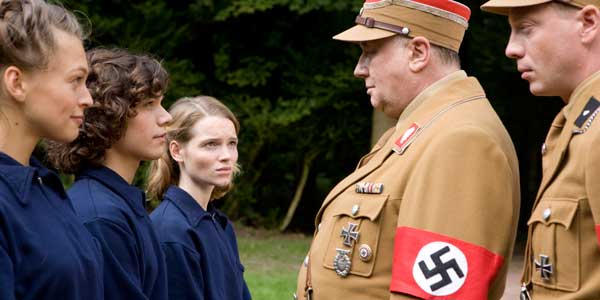
Director: Kaspar Heidelbach
Running Time: 96 mins
Certificate: PG

After the rise of the Nazis, young Jewish high-jumper Gretel Bergmann (Karoline Herfurth) is thrown out of her athletics club and so goes to England where she becomes British champion. While the German rulers are glad to be rid of her, protests in America suggest they won’t send a team unless Jewish people are allowed to compete in the upcoming Berlin Olympics.
The Nazis reluctantly agree to this, including promising to allow Bergmann back onto their team. They even threaten her family in order to ensure she returns to Germany. She heads into training, where she meets fellow competitor Marie Ketteler (Sebastian Urzendowsky). They hit it off, but Marie has a big secret. And while Gretel has been allowed back into the German team, it becomes increasingly clear that the Nazis have no intention of actually letting her compete and potentially beat the Aryan competitors.
Berlin 36 is based on a truly amazing true story, but unfortunately it’s made less interesting than it could have been. It’s heavily fictionalised, so much so that there’s the constant nagging feeling that you’re being sold a tale that glosses over the complexities of the story rather having history come alive in front of you. That’s especially true of the Nazis, who are portrayed a bit like comic book villains.
Part of the problem is that it doesn’t quite seem to know what to do with the Marie Ketteller side of the story. The film makes her a man raised as a girl, who the Nazis knowingly put into the women’s team in the hope of ensuring there’s someone better that Bergmann – even if it’s a man in a dress. The film knows that in real life she wasn’t really the villain of the story but isn’t quite sure how to handle her, even though it’s Marie that makes this an exceptional rather than just an interesting story.
In reality Marie was Dora Ratjen, who was born with an intersex condition that meant it wasn’t clear at birth which sex to assign. The doctors said to raise the child as a girl, although by the age of 10 Dora started to feel that he was actually a man, although apparently never asked at the time why he was made to wear girl’s clothes. While it superficially makes it a better story that the Nazis knew and forced him to compete as a woman (which is what many said afterwards), there’s no real evidence anyone suspected anything, and Dora was too embarrassed to ever say anything to anyone. Indeed it wasn’t until 1938 that the truth came to light, after authorities became suspicious and Dora told them the truth, with a doctor confirming that he had a malformed penis.
Afterwards Dora became Heinrich and lived his life as a man – although all his athletic achievements as Dora were stricken from the books – and he refused to speak about that time in his life.
Unfortunately the film seems unsure what to do with Dora/Marie and barely scratches the surface of a boy raised as a girl, who knows he’s a boy even though to the world he’s always been a girl. It’s a situation made all the more interesting as at a time no one knew all that much about sex, gender and sexual identity, so Dora really was trapped with few places to turn. Although Berlin 36 thankfully steers clear of making its Marie a villain – in many ways she’s the nicest person in the movie – its uncertainty over how to handle what it’s aware is actually the most intriguing part of this tale rather undermines it.
Unfortunately dealing with complex sex and gender issues don’t fit into its rather simplistic, slightly TV movie way of dealing with the Nazis. Considering the unusual source material, it’s almost impressive that it feels like something we’ve seen this 100 times before, and not done in a particularly good way.
Admittedly, even without Dora/Marie, Gretel would be worth making a movie about on her own, as her story is sad and powerful, but here it never really hits home.
Overall Verdict: A truly exceptional story that’s been so fictionalised it never feels real. There are so many fascinating and important issues it nominally brings up, but even those it decides to concentrate on are too simplified and made to fit a basic view of 30s Germany, that the film doesn’t really work.
Reviewer: Tim Isaac





Leave a Reply (if comment does not appear immediately, it may have been held for moderation)